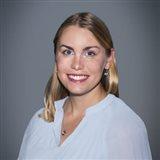Drexel University Represented by Interdisciplinary Delegation at COP27
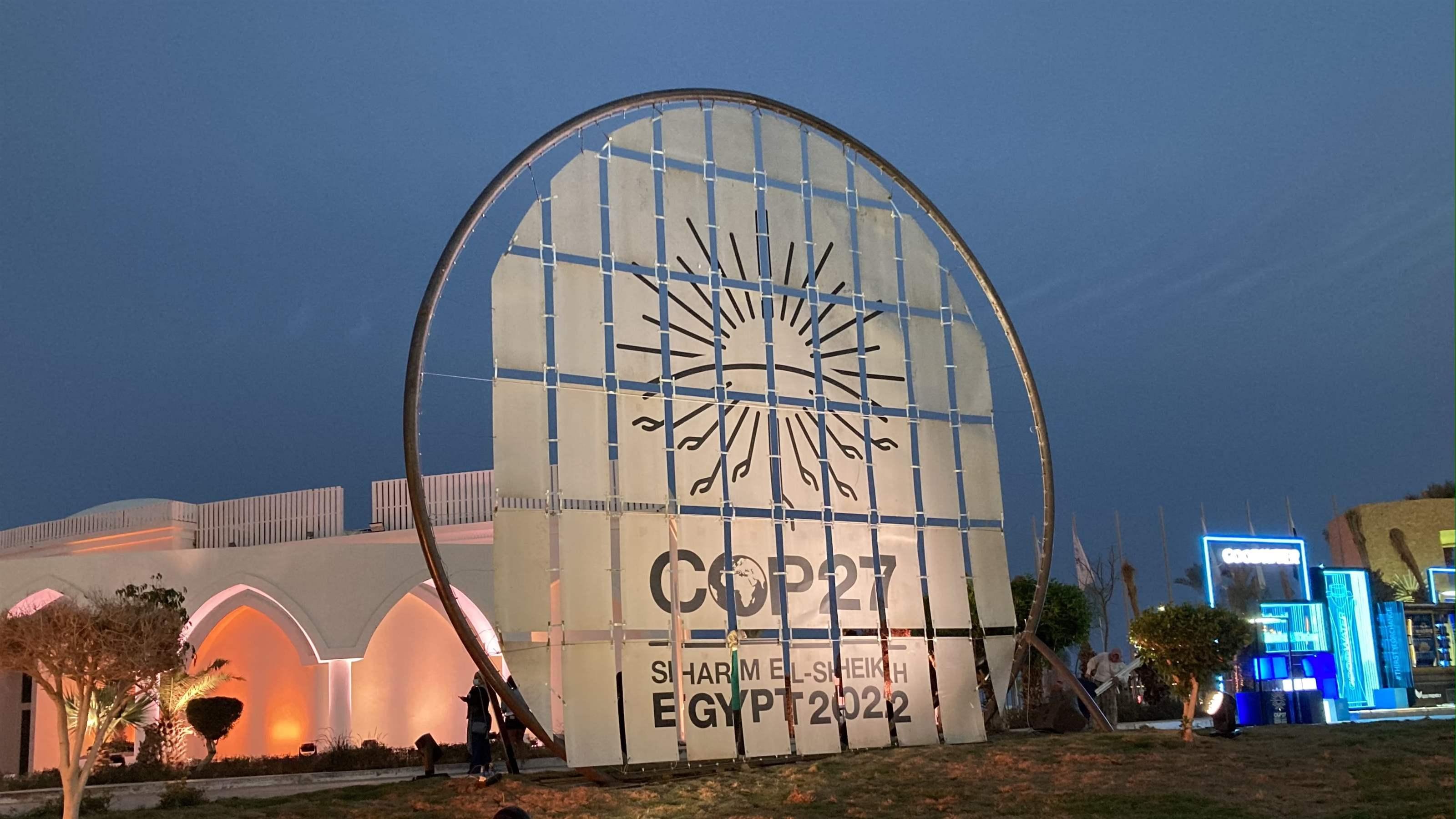
Lena Champlin took a photo of the outer entrance to the conference.
Drexel University’s faculty and student representatives made the most of their time at the 2022 United Nations Framework Convention for Climate Change (UNFCCC)’s Conference of Parties (COP). The university’s delegation made an impact and brought new insights home thanks to their days spent shadowing community advocates, stumbling upon panels and UN meetings and connecting with changemakers. November, nine people from the Drexel faculty and student communities attended COP27 in Egypt.
Drexel has been a permanent observer to COP since 2015, when the Paris Agreement was signed. This means that the University obtains several credentials annually to attend, though the number varies year to year. Adam Zahn, the director of global engagement in the Office of Global Engagement, organizes the delegation, which is partially funded by his office alongside funds from The Environmental Collaboratory.
“We received that (permanent) status by demonstrating Drexel’s already robust research and academic programs in relation to climate change, sustainability, the environment and community engagement,” Zahn said. “We’ve had the opportunity to send Drexel representatives on an annual basis since then and we’ve been growing our presence at COP. We’ve also been building upon Drexel’s activities at COP. Initially it was more about networking and learning from other practitioners, policymakers and change agents, but last year Drexel held our first side event. I can only see us building on these successes in future years.”
Potential attendees apply and are accepted based on the amount of credentials that get approved. Zahn said the University tries to have interdisciplinary groups go every year, but also makes sure to include repeat attendees like the College of Engineering’s Civil, Architectural and Environmental Engineering Professor Franco Montalto, PhD, who leads many of Drexel’s efforts to combat climate change. His attendance at COP recently resulted in Drexel becoming the North American hub of the Urban Climate Change Research Network. Other faculty attendees included Vice Provost and Executive Director of the Environmental Collaboratory Mathy Stanislaus, Esq.; School of Education Associate Clinical Professor Kristy Kelly, PhD, the College of Arts and Sciences’ Department Head of Biodiversity, Earth and Environmental Science David Velinsky, PhD; and Westphal Associate Professor of Film and Television Ben Kalina. Graduate students who attended were Sarah Wetzel, Ashley Trump and Lena Champlin.
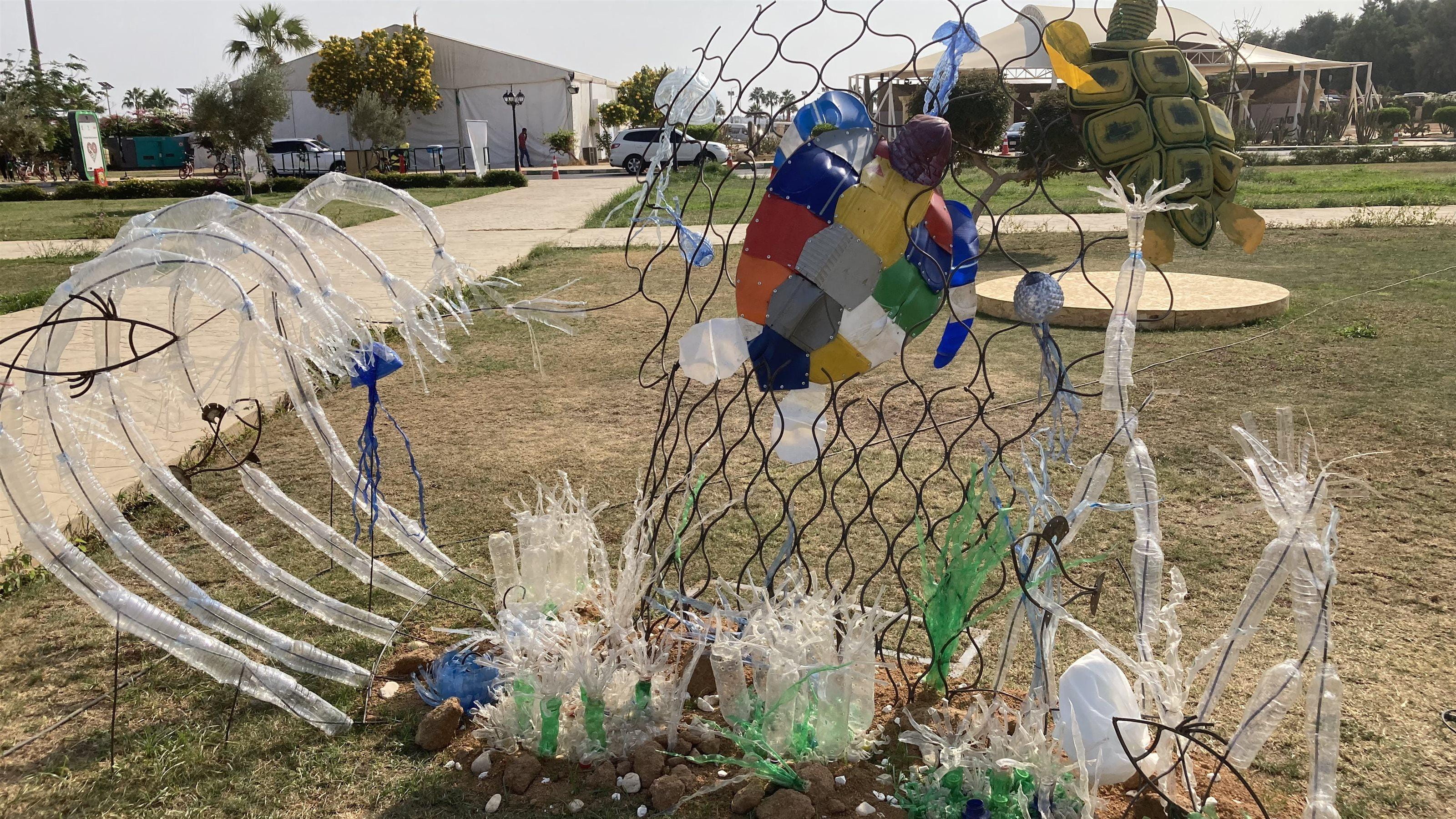
Lena Champlin took a photo of some of the recycled art at the conference.
Gaining new perspectives
Champlin, a fifth-year PhD student in the biodiversity, earth and environmental science department, was a first-time attendee. She appreciated the opportunity to look at climate change through a bigger lens than she has through her PhD research, which is focused on a narrow field of science. She spent time at COP wandering the panels and stumbling upon things that were interesting, and she enjoyed the Green Zone, where the community outside of COP could interact with the conference and see art related to environmental issues.
“There was so much going on (at COP),” Champlin said. “I’m interested in climate science education and communicating about climate science through outreach. As someone coming from more of the hard science side of things who’s also interested in learning how to incorporate interdisciplinary teaching about climate change, I bounced around a lot to different parts of the conference.”
Champlin attended some panels focused on water and ocean science and some that were more focused on research, which were similar to conferences she’s attended in the past. However, some of the more interesting events she attended focused on climate education and women’s role in the global climate discussion. For example, The People’s Plenary, led by representatives of the constituencies of women, indigenous peoples, youth, workers, and others, exemplified the relationship between climate and social justice topics.
“I want to work in a space that’s very interdisciplinary, involving science research and education, so I loved having conversations with people that were from all sorts of different fields,” Champlin said. “I think this was the first meeting that I’ve been to that was focused around a topic rather than a field and I think that’s important. Thinking about climate change from a global perspective and how it intersects with all sorts of issues of injustice for people is important to communicate to students in environmental science courses. Also, teaching about climate change within a broader context may make environmental education more accessible to people. It’s not only about the detailed science of climate change. This broader perspective will influence how I talk about climate change with my students.”
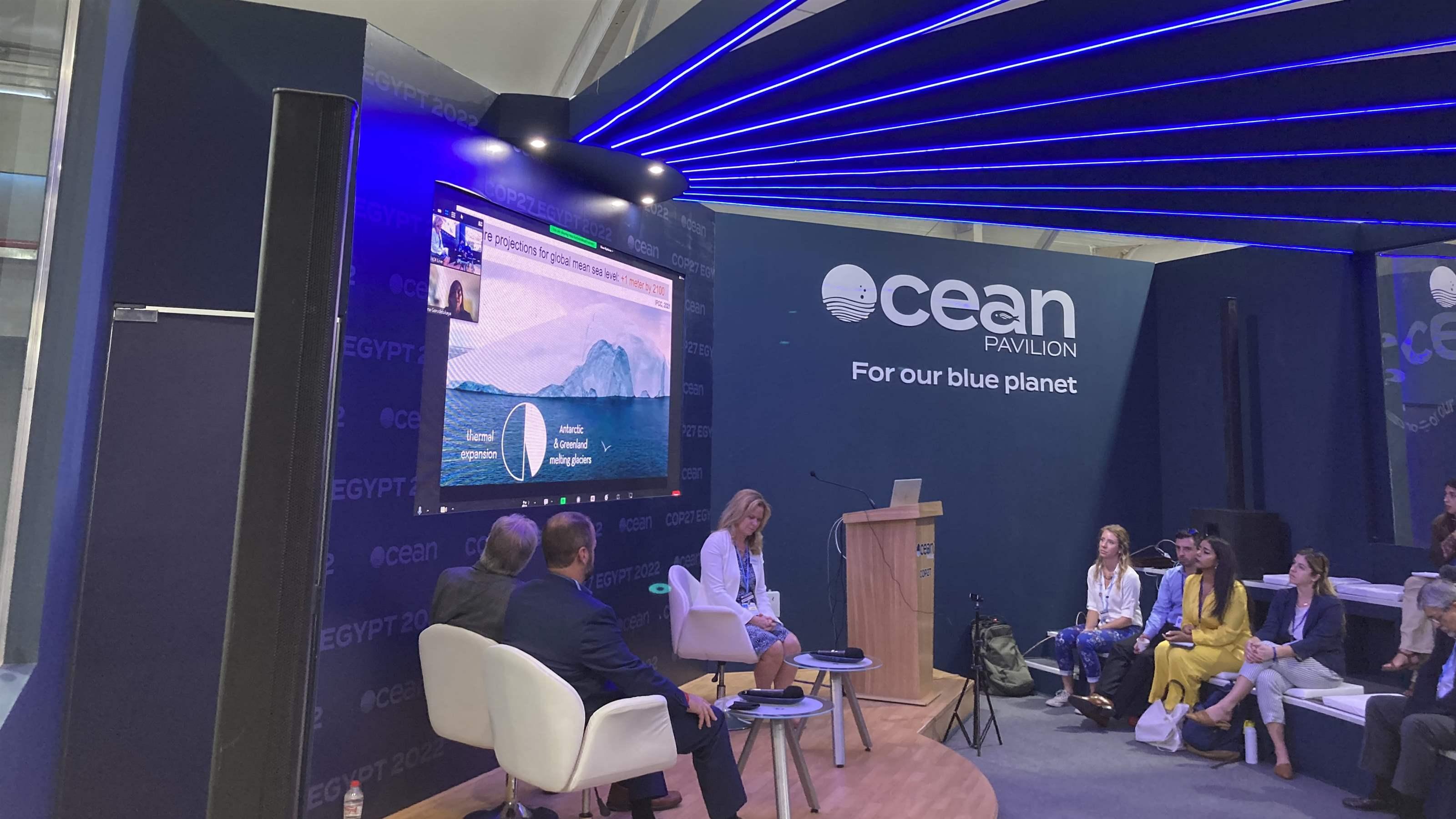
Lena Champlin took a photo of the Ocean panel she attended.
Expanding on experience
On the other end of the COP attendance spectrum, Stanislaus attended his third COP this year. However, it was his first as the vice provost of the Environmental Collaboratory. Previous conferences have been more about building the framework, he said, but this one started to move that forward. This was supposed to be the “implementation COP,” but it didn’t quite meet the moment, he said.
“This COP was different in one positive way in that there was more about how we need to double down on efforts in various sectors about addressing the problem in front of us,” Stanislaus said. “It was less about whether we need to do it and more about how we clearly need to do more, so I think that’s a positive sign. I think the focus next year should be on establishing a structure of implementation, learning and scaling. If we’re really going to talk about implementation, we need to be talking about how to build these networks of intelligence and intentionally bring together diverse and divergent stakeholders and perspectives to develop solutions that work in the real world to transfer knowledge and best practices.”
Now that Stanislaus is embedded in academia in his new position with the Collaboratory, he sees academia as a potential avenue for solution building. It can translate science into solutions and academic expertise can help battle the distrust in science that has become more prevalent in recent years.
“Academia itself needs to challenge itself to go beyond the traditional walls and change the culture and engage external and community stakeholders to develop joint solutions,” Stanislaus said. “I come from a history of doing community-based work, so I try to approach academia in terms of the conversations I’ve had in the past. At COP I had discussions with representatives from the White House and the World Economic Forum regarding how academia can play an essential role in providing trusted experts to develop solutions with knowledge products.”
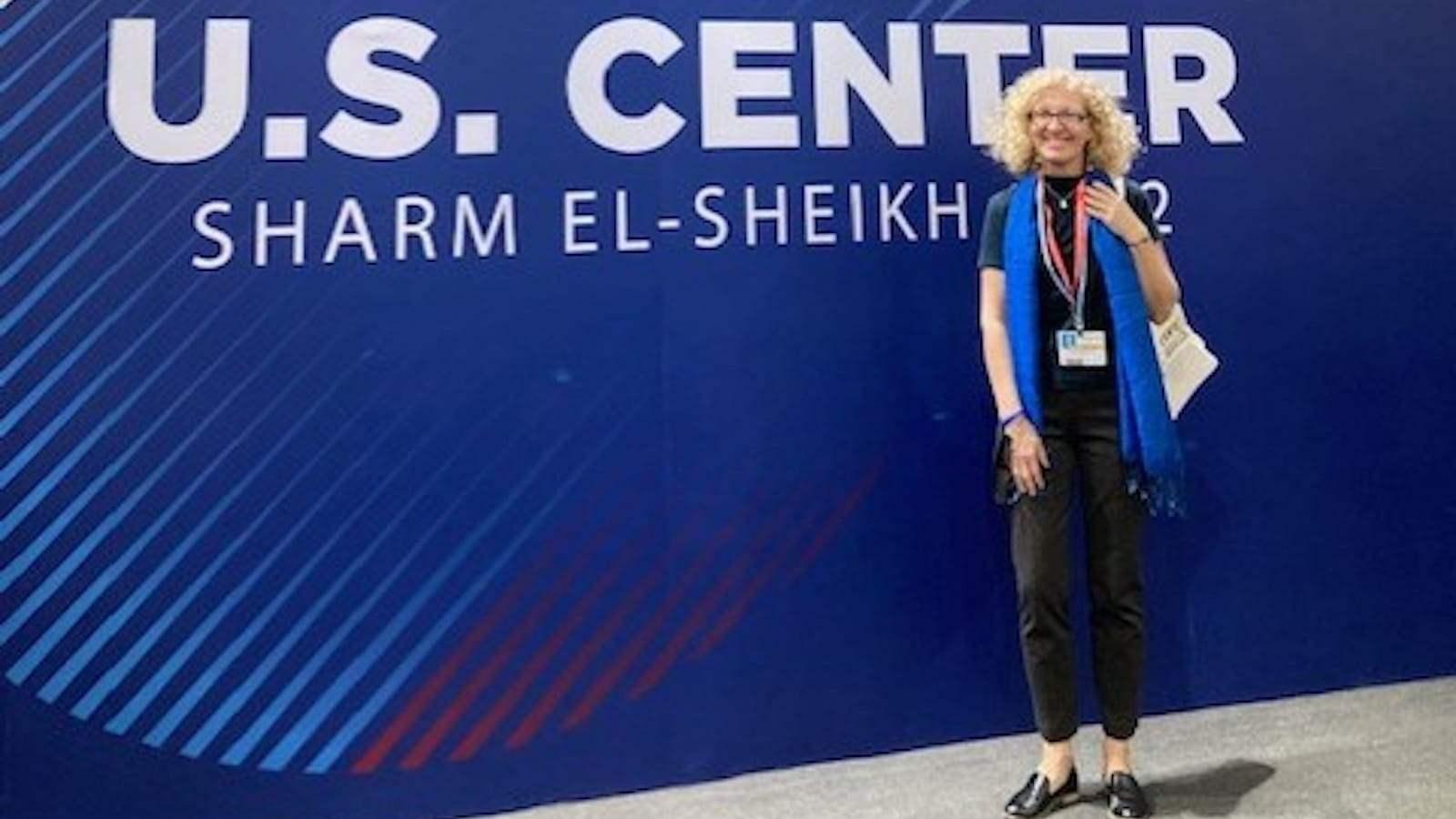
Kristy Kelly posed for a photo at the U.S. Center at the conference.
Documenting the process of progress
Not everyone who attends COP is a scientist or even just there to talk about the research — far from it. Kalina, a documentary filmmaker who previously attended COP21 in 2015, went with the intention of working on multiple projects, including a piece with The Intercept about human rights in Egypt and the climate justice movement at COP, two interviews for an episode of NOVA and material for his upcoming film about climate engineering, currently titled “Plan C.” During his eight days there, he worked with a filmmaking colleague (Clay Hereth, ’11) and an Egypt-based journalist and filmed with Montalto for yet another project.
“There’s 40,000 people there and you’re trying to avoid a bad case of FOMO,” Kalina said. “Luckily for me, I had some specific targets I was trying to reach in terms of filming and storytelling. When I was there in 2015, I was flailing a bit, and I was much more organized this time. It was a lot of figuring out where to film interviews and finding the people we wanted to interview and convincing people to be interviewed. We weren’t free to film outside of the conference itself in Egypt and once we left the Blue Zone, our ability to pull the camera out was extremely limited.”
Now that he’s back, Kalina is working on fundraising for his film and will begin editing the footage with a Drexel film student. He said the importance of democratic norms was on display at this COP and his film will deal with that, along with trying to help people understand the gravity of the climate situation. He saw an energized activist community at the conference, too.
“Sometimes it doesn’t feel as urgent as it is, and we want to help people see some ideas that are coming down the line about how to heal the planet,” Kalina said. “They’re ideas that really require a lot of public understanding because as scary as they are, they’re important.”
Kelly, an education professor and sociologist with an emphasis on gender equality and the politics of knowledge, attended her second COP with the goal of understanding how social movement actors and protests are organized and how those people hold their governments accountable, because there’s a lot of social protest at COP. She spent her time shadowing different people for a day, including the head of the UN Women’s organization from Laos, an indigenous woman from the Amazon and a woman from Uganda who comes from a rural community who represents 2,000 local women and attends to understand climate change and bring information back to her community.
“She knows they’re on the front lines of climate change and if they don’t understand what’s happening and the science and politics around it, they can’t adapt their farming practices,” Kelly said. “She stands up and voices these concerns for farmers. You see all these ethnographic experiences and you get a sense of who comes to COP and what they’re trying to achieve. It’s a space where civil society comes together to share information, to network, to have their voices be heard and to further whatever goals they think are important."
Kelly is interested in how knowledge is produced and disseminated around the world through large organizational networks like COP. It's important to see who’s protesting and what methods they’re using.
“In social movement theory, we think of protest as the activity of last resort,” Kelly said. “If you can’t get to the table or your goals are not being heard, all you can do is protest. Year after year we see issues that are in the protest space and then over time, they make it into the constituency space. We can follow issues through this social movement activist process, and I like to see how that change happens and what effective strategies people use to get there.”
Examining insights
The Drexel delegation didn’t attend all at once, but their daily routine was similar: Wake up at the hotel, get taken to the conference via bus, spend more than 12 hours attending panels and networking, and return to the hotel only to do it all over again the next day.
Many from the delegation also shared some of the same conclusions about the conference: That this year was when the connection between climate change and human rights started to crystallize.
“It helped me reorient myself a bit to understand how critical that interplay will be going forward in terms of making the kinds of changes we need to make globally,” Kalina said. “I saw how critical it is to have a strong voice coming from community activists on national and international levels. They’re pushing to focus on helping the people who are vulnerable, which I think is one of the first things that gets pushed to the side.”
Zahn said there’s been a need for more diverse representation at COP in the past that started to emerge this year with the inclusion of more indigenous groups. Kelly saw it start to come out but noted that there were still strides to be made — there were still too few women, young voices and indigenous communities present, even though those groups are often used as objects to symbolize what COP is about when you look at media by and around the conference.
“Climate change as a social activist space is still rather new to me, but what I’ve taken away is that it’s very difficult to connect the way we educate the next generation about climate change with what to do about it,” Kelly said. “I think we need to connect more of the teaching with activism and those doing the science. We need all these people at the table sharing information and coming up with more creative solutions.”
Now that the delegates are home, they’ll try to incorporate what they’ve learned into their work and the Drexel community to come up with those creative solutions. Zahn said delegates often come back feeling energized about the role of activism and they realize that while COP is important on the large scale, change at local levels is perhaps even more important. The delegation will host a follow-on event to share their insights with the community early in the new year.
“The small-scale stuff is important, but it's only when we connect all of those small-scale shifts and changes to something big, and going to COP helps us do that,” Kelly said. “I think continuing to have people go can create a more inclusive way of thinking about what we as a Drexel community can do and how we can model the way moving forward.”
In This Article
Drexel News is produced by
University Marketing and Communications.
